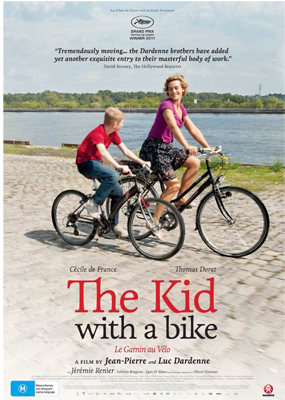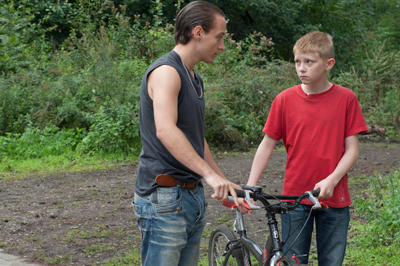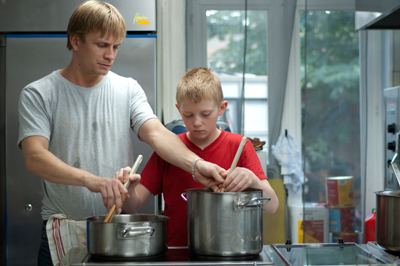Jean-Pierre and Luc Dardenne The Kid With A Bike Interview

Jean-Pierre and Luc Dardenne The Kid With A Bike Interview
Interview with Jean-Pierre and Luc Dardenne
Question: How did The Kid With A Bike come around?Luc Dardenne: We'd had the story in our heads for a long time: a woman who helps a boy emerge from the violence that holds him prisoner. The first image was this kid, this ball of nerves, pacified and soothed thanks to another human being.
Jean-Pierre: First we imagined Samantha as a doctor but we changed our minds and decided she was going to be a hairdresser, settled in her neighbourhood for a long time.
Question: The film is very moving without ever falling into sentimentality.
Jean-Pierre: Thank goodness!
Luc Dardenne: We were adamant that the audience would never find out why Samantha is drawn to Cyril. We didn't want psychological explanations. We didn't want the past to explain the present. We wanted the audience to think: "She is doing this!" Which is plenty already.
Question: Cyril is always on the move. He's restless.
Jean-Pierre: Yes, he's often on his bike... This kid without any ties runs after love without knowing it.
Question: Child-parent relationships often feature in your films: The Promise, The Child, The Son. Why?
Luc Dardenne: We are all 'sons of' and 'daughters of'�
Jean-Pierre: Society makes stars of the individual. Perhaps it's as a reaction to this that we keep coming back to the notion of a link. Even if it isn't always biological, as with Samantha and Cyril...
 Question: Despite the violence of Cyril's story the film has a bright side.
Question: Despite the violence of Cyril's story the film has a bright side. Jean-Pierre: Yes, we have tried to find some fluidity, something tangible in the direction. We filmed in the summer, which is a first for us.
Question: Is kindness difficult to film?
Luc Dardenne: On the face of it, evil is always more exciting (laughs). It was very important that we shouldn't portray a clichéd kindness, of course, but that we stick as closely as possible to this feeling of openness and exchange.
Jean-Pierre: Filming a character who has someone else's best interests at heart hasn't often happened to us. Shooting in the summer helped us give the film a certain brightness and softness. And Cécile de France conveys these qualities naturally.
Question: It's unusual for you to work with renowned actors.
Luc Dardenne: Nothing was programmed. We never write with a specific actor in mind. As soon as we finished the screenplay we started to think about actresses and about Cécile first. With her we knew we'd avoid all psychology... that her body and her face were enough. We gave her the screenplay and she accepted right away. She asked us a few questions regarding the motivations of her character. We told her Samantha was there, end of story. She trusted us.
Question: She seems to have rediscovered her Belgian accent...
Jean-Pierre: Yes! We were very careful with the accent. We didn't want "the French actress has arrived!" effect. Cecile is Belgian, let's not forget that. She grew up not too far from where the film takes place, in the Meuse Valley, but her accent is slight and we didn't want to overemphasize it.
Question: How did you find Thomas Doret, the boy who plays Cyril and is almost always on screen?
Jean-Pierre: The usual way when you're looking for actors of his age: we put an ad in the papers then held a casting of about a hundred kids. Thomas came on the first day, he was the fifth one we saw and it clicked right away.
Luc Dardenne: Right from the start we were struck by the expression in his eyes, his stubborn air, his look of concentration...
Jean-Pierre: He also had an astonishing ability to learn his lines� and he had a lot of them. From the first tests - which in fact are the opening scene of the film - we felt that he was the character. He had an intuitive understanding of his part. Something immediately accurate and poignant, without ever snivelling.
Luc Dardenne: He was the only one who was there consistently during the six weeks of rehearsal. He found himself in the position of leader! He already knew all the scenes by heart even though we hadn't yet asked him at that stage. And he got it wrong, he'd get really mad. Thomas is a brown belt in karate! It helps him with his concentration and his memory.
Question: Two of your regulars also make an appearance: Oliver Gourmet, and Jeremie Renier, in the difficult role of the father.
Luc Dardenne: Olivier Gourmet just pops in, we had to find something for him to do! (laughs). We proposed him three options and he chose to play the cafe owner who serves the beers. It's only a small scene but it's important to use that he's there.
Jean-Pierre: Jérémie Renier's part is meatier. Once he finished reading the screenplay and discovered his character he immediately told us that We'd found yet another lovely part for him to play! (laughs) But he plays the nice guys in other people's films so�
Question: How did you write the screenplay? How long did it take?
Jean-Pierre: One year in all, with a few breaks. But we had discussed it at length beforehand.
Luc Dardenne: We start with one character, one situation, and we make notes on everything that we find interesting. Then comes the structure, then a first draft, then another, then another... It takes us months.
Question: And the shoot?
Luc Dardenne: 55 days. With short nights. But we never worked after 1:30am� maybe once. We were filming with a 13-year-old boy. We were very prepared. We've never rehearsed so much before a shoot.
Question: In The Kid With a Bike there's a city but also the forest that borders it�
Luc Dardenne: We imagined a geographical triangle for this film: the city, the forest and the gas station. The forest is a place of dangerous attractions for Cyril, the place where he can learn how to become a crook. The city embodies the past with his father, and the present with Samantha. The gas station is a place of transition, where the plot takes numerous new turns.
Jean-Pierre: We wanted to construct the film as a kind of fairy tale, with baddieswho make the boy lose his illusions, and Samantha, who appears as a kind of fairy. For a short while we even thought of calling the film 'A Fairytale For Our Times'.
Question: For once you use music, even though sparingly...
Luc Dardenne: It's very rare in our films and we hesitated for a long time. In a fairytale there has to be a development, with emotions and new beginnings. It seemed to us that music, at certain points, could act like a calming caress for Cyril.
Question: You're back in Cannes again, where you have already won two Palmes d'Or (for Rosetta in 1999 and The Child in 2005). What does festival mean to you?
Jean-Pierre: It's very important that we show our films here. It's lovely to come back each time. We love the adrenalin rush that you only get in Cannes.
Luc Dardenne: Our cinema owes a lot to this festival. Our story continues here, a happy one so far...
 Cast: Thomas Doret, Cécile De France, Jérémie Renier
Cast: Thomas Doret, Cécile De France, Jérémie Renier Directors: Jean-Pierre, Luc Dardenne
Genre: Drama
Rated: M
Running Time:87 minutes
Synopsis: Cyril, almost 12, has only one plan: to find the father who left him temporarily in a children's home. By chance he meets Samantha, who runs a hairdressing salon and agrees to let him stay with her at weekends. Cyril doesn't recognise the love Samantha feels for him, a love he desperately needs to calm his rage.
Release Date: March 15th, 2012
MORE
- Mission: Impossible Fallout
- Glenn Close The Wife
- Allison Chhorn Stanley's Mouth Interview
- Benicio Del Toro Sicario: Day of the Soldado
- Dame Judi Dench Tea With The Dames
- Sandra Bullock Ocean's 8
- Chris Pratt Jurassic World: Fallen Kingdom
- Claudia Sangiorgi Dalimore and Michelle Grace...
- Rachel McAdams Disobedience Interview
- Sebastián Lelio and Alessandro Nivola...
- Perri Cummings Trench Interview



